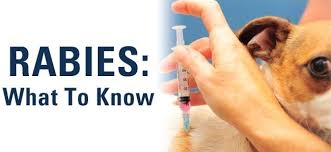Pet owners encouraged to vaccinate against rabies
Ponca City Now - May 3, 2018 11:30 am

With the onset of Spring, it is common to see an increase in cases of animal rabies across the state.
Thus far in 2018, there have been a total of nine rabid animals in the state – eight skunks and one cow. The Oklahoma State Department of Health encourages those with pets and livestock to make sure their animals are properly vaccinated.
“Vaccinating your animals, particularly dogs, cats, horses and valuable cattle, against rabies can prevent both disease and heartbreak for you and your family,” said State Epidemiologist Dr. Kristy Bradley. “When pets are unvaccinated, their vaccinations are out-of-date, or pets are not vaccinated by a licensed veterinarian, their owners have some very tough decisions to make if their pets are exposed to a rabid animal.”
In order to prevent the continued spread of rabies, public health law requires unvaccinated animals exposed to a rabid animal to be either quarantined at a veterinarian’s clinic for four months (dogs and cats), or euthanized at the owner’s expense. Unvaccinated horses or livestock animals exposed to a rabid animal are generally quarantined on the owner’s premises for six months with periodic evaluation by a licensed veterinarian.
Although rabies symptoms can vary, it is important to be suspicious of animals exhibiting the following behaviors:
- Lack of fear of people
- Listless, confused, or less active than normally expected
- Having difficulty moving or appearing paralyzed
- Unusual or inappropriate aggression (without being provoked)
“Although most rabies cases in Oklahoma occur in skunks, most human exposures to rabies result from contact with unvaccinated pets or livestock which become rabid following an encounter with a rabid wild animal,” said Bradley. “Having your pets currently vaccinated has the added benefit of protecting your family from exposure to rabies and avoiding any need for the costly and uncomfortable process of receiving post-exposure shots.”
Oklahoma rules and regulations require an owner to present their dogs and cats to a veterinarian for rabies vaccination by the time the animal is 4 months of age, but the vaccines can be safely given as early as 3 months of age.
The time to revaccinate depends upon the documentation of previous vaccines, age of the animal, type of vaccine administered, and city licensing codes.
All horses and livestock having frequent contact with humans, such as those in petting zoos, fairs and other public exhibits, are recommended to be vaccinated against rabies. Owners should consider vaccinating other livestock that are particularly valuable. It is recommended to consult with a veterinarian about vaccination recommendations for all pets and livestock.
Rabies is a viral disease affecting the central nervous system and is usually fatal once symptoms of the disease have started. Rabies is found in the brain, spinal cord, and saliva of infected animals and is transmitted through a bite or through contact with open skin wounds or mucous membranes of the eyes, nose, or mouth.
If anyone suspects an animal has been exposed to rabies, they should immediately contact a veterinarian or the local county health department for guidance. Individuals can also consult with the OSDH Acute Disease Service epidemiologist-on-call 24 hours a day at (405) 271-4060 for evaluation of rabies risk and guidance on submitting an animal for rabies testing.
For more information about rabies, visit the OSDH web site at http://www.ok.gov/health/.



